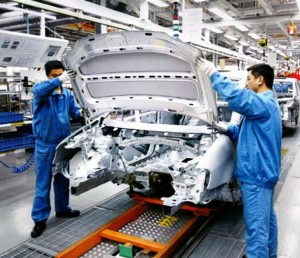The Volkswagen Group will continue its expansion in China during the next few years despite uncertainties about the global economy. Between 2009 and 2011 VW will invest in a total of €4 billion in the world’s largest automotive market to introduce new vehicles and expand its production capacities in China. These investment plans were approved last week by the Supervisory Board of Volkswagen Aktiengesellschaft.
The expansion will be financed from the cash flow of VW Group’s Chinese joint-venture companies, which are required by Chinese industrial policies. The U.S. remains the only industrialized nation in the world without an industrial policy, as job losses continue and unemployment reaches highs not seen since the Great Depression.
At VW’s Nanjing and Chengdu plants production is to be boosted to 300,000 and 350,000 vehicles respectively by 2012. VW has long been the market leader in China since the Communist party chose it to help set up First Auto Works as the supplier of government vehicles. All of VW’s Chinese plants are joint ventures as required by Chinese law.
“For the Volkswagen Group, China is one of the most important markets in the world. We are already well-positioned there with a broad product portfolio,” said Prof. Dr. Martin Winterkorn, Chairman of the Board of Management of Volkswagen AG.
“Demand for our models is growing so dramatically that our capacities in China are no longer sufficient. Our investment decision has laid the foundations for continuing the Group’s success in China in the future,” Winterkorn added.
VW is fighting to overtake Toyota as the world’s largest automaker
Overall, the Wolfsburg-based German automaker saw sales of light vehicles decline 4.4% during the first half of 2009, as its global sales declined 18%. This was a relatively better performance than the overall market, and came in spite of troubles with its Skoda and Seat brands in Europe, notably in Spain and the U.K. VW is fighting with Toyota and General Motors for the top spot as a global automaker.
The real growth, which kept VW Group in the black during Q2 to the surprise of some analysts, came from strong performances by the VW brand in Brazil (+7%) and China (+23 %), now VW’s largest market. Audi also contributed with its strong performance in the Chinese market.
Financial results were also good for the first half of 2009 as the Group made a €1.2 billion operating profit. Its global market share is now 12%, which makes it number two in a close race with Toyota.
“In China, we will see clear double-digit growth in 2009 and expect to remain the market leader in the future. Volkswagen Group China is well on the way to reaching the target of doubling sales to two million vehicles laid down in our Strategy 2018 earlier than planned,” said Dr. Winfried Vahland, President and CEO of Volkswagen Group China.
The planned investment of a total of €1.3 billion in new products and capacity expansion will include additional production facilities with body, paint and assembly shops at Nanjing and Chengdu. Starting in 2012, three new models are scheduled to come off the production lines at Nanjing and two at Chengdu.
Volkswagen Group China has already put 7.3 million vehicles on Chinese roads. Volkswagen has 14 joint ventures and solely owned enterprises in China, covering the manufacturing, sales and service of cars, auto parts, engines and transmissions, as well as financial services.
This year, three new models have been launched on the Chinese market, the Volkswagen Golf (ahead of its U.S. introduction), the Volkswagen Passat New Lingyu, and the Škoda Superb. The product offensive is to receive a further boost from the scheduled introduction of highly advanced Group technologies such as the 7-speed transmission or economical direct injection engines in to the Chinese market.
Currently, models manufactured in China include the Volkswagen Polo, Lavida, Santana, Santana Vista, Passat New Lingyu, Touran, Golf, New Bora, Jetta, Sagitar and Magotan, as well as the Škoda Fabia, Octavia and Superb and the Audi A4L and A6L.
VW said the monetary and fiscal measures taken by the Chinese government this year have provided positive impetus for the Chinese automobile industry. In China, deliveries by the Group rose to 652,222 units (2008: 531,612 units; +22.7%) in the first half of 2009. China started automotive incentive programs back in January just as the U.S. Congress started a debate about them that lasted for six months. The Chinese Government tweaked and expanded the programs all year.
In the U.S. in spite of almost $1 trillion in promised stimulus spending, the economy continues to decline and unemployment is now near 10% and rising. The short-lived “Cash for Clunkers” program did boost sales for one month, but there are apparently no plans in Congress to renew it, or to address the failed stimulus package.

